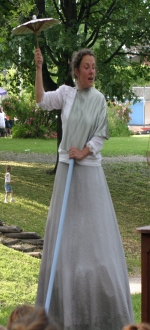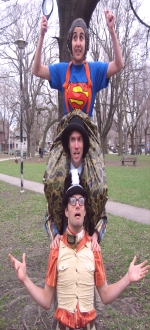

Clyde Umnie Co (Toronto) and NACL (Highland Lake, NY) - The Little Farm Show
Created and performed by Tannis Kowalchuk and Jane Wells
Carrot created by Laura Astwood
All other design elements by Sherri Hay and Tannis Kowalchuk
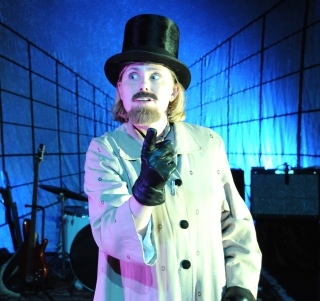
The Little Farm Show tells the story of an organic farmer named Millicent, and a giant, over-grown carrot hepped up on hormones, who has escaped the industrial carrot farm because she is too big to sell. Realizing her destiny is to be broken up and sold as a bag of ‘mini-carrots’, the Carrot makes a break for it, but soon discovers her freakishness out in society. When the play begins, we see Millicent on her little farm, singing and chatting with the audience, doing her chores, while behind her, as the audience can see but she cannot, a giant figure, slowly approaching, sneaking up as discreetly as possible. When Millicent finally spots her, the Carrot throws herself at Millicent’s mercy. She isn’t asking much, just a nice shower of water for her roots and a bit of soil for her bed that night. She tells her story, and Millicent listens, and comments. Their conversation is part dialogue, part duet, part dance. They trill about the benefits of chemically and genetically enhanced vegetables (shelf-life, yield) and then harmonize on the drawbacks - no taste! Finally Millicent suggests that the carrot stay on the farm with her. She can see that although the carrot has not been built for taste, she has got strength and stamina, and will make a good farm worker. The carrot is thrilled and they stroll off into the sunset.
Théâtre Populaire d’Acadie (Caraquet, NB) and Satellite Theatre (Montreal) - GRUB
A show by Marc-André Charron & Mathieu Chouinard. Assistant everything: Noémie Roy-Lavoie.
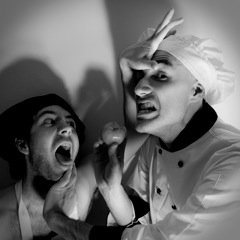
“Bread and circuses!” said Juvenal. We’re taking him up on it. GRUB is a theatrical exploration of food in all it’s livelihood, insanity and outrageousness.
In a glorious feast touching sometimes upon the clown, sometimes upon the burlesque, yet always the urge of an empty stomach, this play speaks of food and all it’s substitutes, linking it all by a simple but true fact: eating is killing. May it be animals or veggies, eating links us inevitably to the great circle of life. Like the digestive system and all it’s mechanics, every species serves the planetary lunch. In the great jungle, eat... or be eaten!
Grub is at the same time cuisine, recipes, feasts! It’s also survival, struggle, famine. In a world full of the thirsty and the famished, just how far can we go to sustain ourselves? So come, sit down... is that a stomach we hear?
Theatre Smith-Gilmour (Toronto) - GRIMM too
Written by Michele Smith and Dean Gilmour in collaboration with the company
Directed by Michele Smith and Dean Gilmour
Performed by Michele Smith, Dean Gilmour, Adam Paolozza, Dan Watson and Pragna Desai.
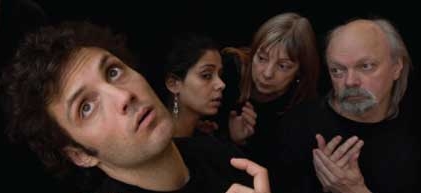
For the Cooking Fire Festival Theatre Smith-Gilmour will be performing parts of GRIMM too, which played at the Factory Theatre in March 2010 in it’s full length version. It is a poignant and stunning piece of absurd theatre that finds its inspiration from the tall tales unearthed by the Brothers Grimm. Faithful to the original Grimm stories, GRIMM too is a stunningly whimsical and moving piece filled with romance, tragedy, and comedy. These strange, mythical stories speak to us about our own experiences of fear, courage, love, hope, joy and wonder in our current daily lives, telling us that what is most important is freedom, tenderness and tolerance.
The Brothers Grimm traveled throughout Germany and France collecting tales full of fantastical characters that had been passed on from storyteller to storyteller over the centuries, some of which can be traced back to the ancient language of Sanskrit.
As day turns to night and darkness approaches, storytellers come out to spin their lies: beautiful lies that “stage” the invisible, giving way to a deeper reality, reminding us of who we are and what it is to be human. These mythical stories speak to the violence we experience in daily life, taking audiences into the absurd world of myth where nothing is what it seems to be and life is in a constant state of change
The Hinterlands (Milwaukee, WI) - The Dead Road
Directed by: Richard Newman
Performers: Liza Bielby, Richard Newman, Jamie Van Camp and Jason Waszak
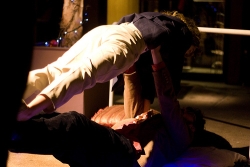
The Dead Road is an original piece of ensemble-based, physical theatre created and performed by The Hinterlands, exploring themes of identity, archetype, and assimilation in the Wild West. Inspired by the language of Cormac McCarthy and William S. Burroughs as well as the Spaghetti Westerns of the 1950’s and 60’s, The Dead Road is equal parts Wild West Show and cultural scavenger hunt, balancing the silence and stillness of the open range with the rowdiness and sweat of a barroom brawl. The Dead Road weaves spectacle, vaudevillian comedy, live music, cowboy poetry, campfire songs, puppetry, dreamlike imagery, and the smell of frying bacon into a highly physical, sensory collage.
Dufferin Grove Park will be transformed into Dodge City when The Dead Road comes to Toronto. Using the script of Wild Bill’s original Wild West show as a guide, The Hinterlands have created a passion play for the North American frontier that both enlightens and entertains, shocks and delights. Ritual, comedy, historical reenactment, feats of strength and skill, black hats, white hats, shootouts and singalongs: all’s fair once you head down The Dead Road. The piece features original and adapted music inspired by cowboy and country ballads as well as cinematic western scores.
The Dead Road delves into the collective history of North America to seek correlations between the diverse, larger-than-life characters who occupy the mythological territory of the west, and the actual people who lived and died there. Through a deep exploration of their own cultural images and archetypes, The Dead Road brings the Wild West to life, complete with its gunslingers, cowboys, lawmen, Chinese laundrymen, Indian chiefs, prospectors, pioneers, and hookers with hearts of gold.
The Alchemical Opera Project (Easthampton, MA) - Come and Sleep
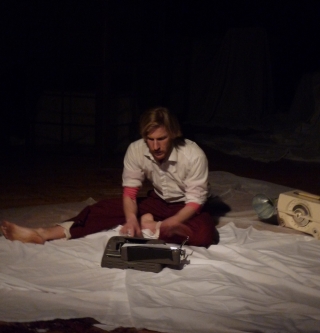
Created and performed by Todd Trebour
Wanting desperately to escape his vulpine existense, Fox transforms into a human only to find himself in a stark, cold world of overwhelming quiet and solitude. As he attempts to negotiate his new self and surroundings, Fox discovers that a new form doesn't erase old problems. In a struggle against loneliness, the dissolution of memory, and the disappearance of magic, he discovers that the key to his survival is not metamorphosis but imagination. Using music from Schubert's 1827 song cycle Winterreise (Winter's Journey) and poetry by Mary Oliver, Come and Sleep is an operatic fantasy between voice, cello, and silence, exploring the relationship between identity and place, and the consequences of transformation.
The story of Come and Sleep is inspired by Japanese fox folklore and the writings of polar explorers. The design and imagery is drawn largely from the photography of the Antarctic and Czech photographer Josef Sudek. Come and Sleep was initially presented in February 2010 as Todd Trebour's final project while an apprentice at '''Double Edge Theatre''' in Ashfield, MA. Developed over the course of five months through a method combining of movement-based improvisation and research, Come and Sleep is the culmination of nearly three years of work as an apprentice actor and musician at Double Edge, as well as a fusion of Todd Trebour's artistic identities as an operatic performer, physical actor, movement artist, and designer.
comments? e-mail cookingfire@gmail.com
The Cooking Fire Theatre Festival gratefully acknowledges the generous support of:
In partnership with:

